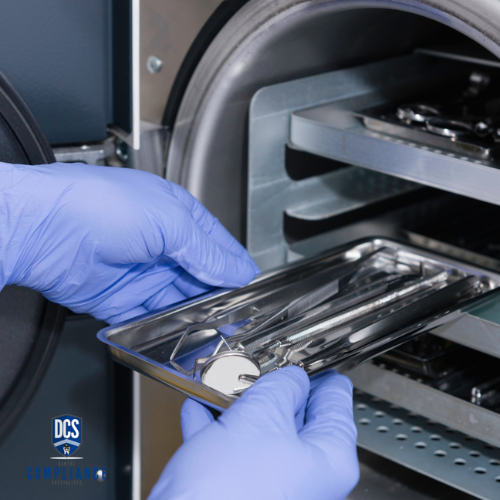Written by Dental Compliance Specialists, LLC
The sterilizer may be the most essential equipment you own in your dental practice. The machine effectively sterilizes dental instruments and equipment; it needs a particular water source. It is necessary to use the correct quality of water to keep the internal components in good working order and prevent the buildup of deposits in your sterilizer. Not only is good quality water essential for the autoclave, but it is equally vital for dental units, too. Sediment can enter dental unit waterlines and interfere with handpiece mechanisms, ultrasonic units, and air/water syringes.
A total dissolved solids (TDS) test is a method that measures organic and inorganic compounds in water. The inexpensive device can be purchased for the office to measure the quality of your water supply.
- Distilled water is purified and free of impurities. Distillation removes salts, minerals, inorganic compounds, and bacteria. This is the purest form of water. Free from contaminants, distilled water is ideal for sterilizers.
- Reverse osmosis (RO) is a water purification method that filters out sediment. RO systems can be installed in dental offices, producing high-quality water. RO water is excellent for self-contained water bottle units. It becomes tricky if used for sterilizers. Because an RO system contains several filters to produce high-quality water, they must be monitored and changed regularly. Reverse osmosis water is not recommended for sterilizers.
- Sterile water contains no organic materials and is free of living organisms. This type of water is used for surgical procedures and parenteral administration.
- Deionized water removes minerals and salts through deionization. The process uses cation and anion resins to produce an almost pure form of water.
Is it worth purchasing a tabletop distiller rather than buying distilled water? Considering the expense of a distiller, space required for the machine, the cumulative needs for quality water (sterilizer, dental units, rinsing instruments during reprocessing), and time it takes to create distilled water, it probably is not a practical decision or effective solution for most dental practices.
Dental Compliance Specialists helps make dental offices safer for patients, dentists and their employees. We help our clients develop and maintain their compliance programs including OSHA/Infection Control, HIPAA, DEA regulations and prescribing practices, Radiation Safety, OIG/Medicaid Compliance, Record Auditing, and more by providing actionable systems, easy-to-use tools, robust training, and accountability. Most of our clients have never been in trouble and want to keep it that way. Sometimes, though, dentists call when they are in trouble. In either case, we are there to make a meaningful difference. If you need help call us at 817-755-0035.


